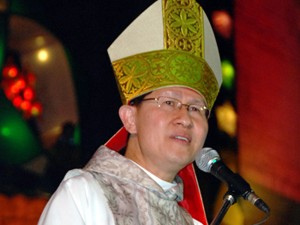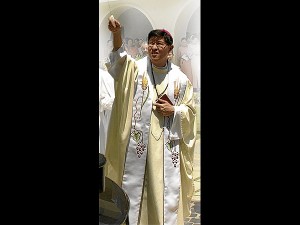CNN analyst sees Manila archbishop a ‘papal contender’
MANILA, Philippines—Habemus papam (We have a pope)?
He has not even been officially installed, but new Manila Archbishop Luis Antonio Tagle has already been tagged as a “papal contender” by a respected international Vatican watcher.
Writing in his blog, CNN Senior Vatican analyst John Allen Jr. tagged the 54-year-old prelate as a “new papal contender,” describing Tagle as “a rising star in the Asian Church” and his appointment by Pope Benedict XVI deserved “to be on the global Catholic radar screen.”
“The big news from the Philippines has been the October 13 appointment of Luis Antonio Tagle as the new Archbishop of Manila, putting him in line to become a cardinal the next time Benedict XVI hosts a consistory,” Allen said in his blog at the National Catholic Reporter (NCR) website.
“Youthfulness aside, a striking number of people who know Tagle believe that this is a guy who, one day, could be pope,” Allen said.
“Even if that doesn’t pan out, Tagle is destined to be an important face and voice for the burgeoning Catholic population in Asia and the entire developing world, and that makes him someone worth getting to know,” he added.
Allen notes that Tagle was known for his humility, humor, warmth, simplicity, ability to explain complex theological ideas in layman’s terms, while not being afraid to raise questions about controversial church issues.
“Although a loyal churchman, Tagle is unafraid to raise tough questions (at the 2005 synod, he pointedly said the church must confront the priest shortage, which struck some as a way of hinting at flexibility on celibacy) or to challenge what he considers abuses (some of the toughest language you’ll ever find denouncing clerical arrogance and privilege is in his writings),” Allen said.
During that 2005 synod of bishops in Rome, Tagle raised his concerns about the shortage of priests during Vatican’s own press conference where he was one of the presenters.
“Theologically and politically, Tagle comes off as balanced. He’s taken strong positions against a proposed ‘Reproductive Health’ bill in the Philippines, which includes promotion of birth control. Yet his towering social concern is defense of the poor, and he’s also got a strong environmental streak,” Allen said.
He described Tagle as a “gifted communicator, making him a highly sought-after speaker and media personality.”
“He drew rave reviews for his performance at a 2008 International Eucharistic Congress in Quebec, where observers say he brought an entire stadium to tears,” Allen said.
“Vatican-watchers also rated him among the most impressive contributors to both the 2005 Synod on the Eucharist and the 2008 Synod on the Word of God. He’s also a very 21st century prelate—he hosts a program on YouTube and he’s got his own Facebook page,” he added.
Allen has noted that while Tagle, at 54, is “in church terms…still a kid,” the new shepherd of Manila’s 2.7 million Catholics was already seen as “a rising star in the Asian Church.”
“The story goes that back in the mid-1990s, when then-Cardinal Joseph Ratzinger introduced Tagle to Pope John Paul II as a new member of the Vatican’s International Theological Commission, Ratzinger jokingly assured the pope that the youthful-seeming Filipino had, in fact, received his first communion,” Allen said.
“(After theological studies abroad, Tagle) quickly came to be seen as a rising star in the Asian church, explaining his appointment in 1997 to the Vatican’s main doctrinal advisory body,” he added.
Fr. Joseph Komonchak, one of the leading Catholic theologians in the US and Tagle’s doctoral teacher at the Catholic University of America, said Tagle could have become the “best theologian” in Asia if he had not been appointed bishop.
“He was one of the best students I had in over 40 years of teaching, but as intelligent and diligent as he was, he was perhaps better known and loved by his professors and by his fellow students for the simplicity and holiness of his life,” Komonchak said in the blog of Commonweal magazine.
“He could have become the best theologian in the Philippines, or even in all of Asia, if he had been given the opportunity, but in his country the demands for the kind of teaching and preaching that he can offer are so many that a man of his talents will never have much time for reading and writing,” he added.
Allen and Komonchak also touched on Tagle’s association with the controversial Bologna-based “History of Vatican II” project, which has been criticized by conservative Catholics — including in the Vatican’s own newspaper L’Osservatore Romano — for providing a “liberal” interpretation of the historic Second Vatican Council.
“Tagle served for 15 years on the editorial board of the Bologna-based ‘History of Vatican II’ project founded by Giuseppe Alberigo, criticized by some conservatives for an overly progressive reading of the council,” Allen said.
Komonchak said Tagle wrote the chapter on “Black Week” or the last week of the third session of the Council in 1964. It came out in volume four of the five-volume “History of Vatican II.”
Tagle’s association with this “liberal” Catholic project makes his appointment more intriguing since the Pope is known for his conservative views on Catholic doctrine.
“It is good to know that such an association is not enough to make oneself entirely persona non grata in the Vatican. I suspect that it was (Tagle’s) work on the International Theological Commission that impressed the present Pope,” Komonchak said.
Allen said Alberto Melloni, an Italian academic and writer who has been directing the Bologna project, called Tagle “a thinker of real value” whose dissertation represented an important chapter in the history of Vatican II, and someone who’s “talented and serious.”
“Back in the Philippines, it would be a gross understatement to say that Tagle, who goes by the nickname Chito,’ is simply well-liked. In truth, most Filipino Catholics I know love the guy — for his warmth and humor, for his simplicity (he routinely eschews clerical dress), for his ability to express complex ideas in attractive and understandable argot, for his balance and openness, and for his lack of ego,” Allen said.
“He actually told a Catholic radio station in the Philippines this week that when he first heard he was going to Manila, he didn’t tell anybody, because ‘I thought maybe the pope would change his mind,'” he added.
Allen noted that one Filipino commentator noted Tagle as having “a theologian’s mind, a musician’s soul and a pastor’s heart.”
“In the Imus diocese, Tagle was famous for not owning a car and taking the bus to work every day, describing it as a way to combat the isolation that sometimes comes with high office,” Allen said.
“He was also known for inviting poor beggars outside the cathedral to come in and eat with him; one woman was quoted this week describing a time she went looking for her blind, out-of-work, alcoholic husband, suspecting she might track him down in a local bar, only to find that he was lunching with the bishop,” he added.
Allen added that another “typical story” happened after Tagle arrived in Imus when a small chapel located “in a run-down neighborhood was waiting for a priest to say Mass for a group mostly made up of day laborers at around 4 a.m.”
“Eventually a youngish cleric showed up on a cheap bicycle, wearing simple clothes and ready to start the Mass. An astonished member of the congregation realized it was the new bishop, and apologized that they hadn’t prepared a better welcome,” Allen said.
“Tagle said it was no problem; he got word late the night before that the priest was sick, and decided to say the Mass himself,” he added.
Being among the top four Catholic countries in the world in terms of population, the Philippines could be considered as a “Catholic superpower” and one of the nations destined to be “pace-setters in the church of the 21st century,” Allen said.

